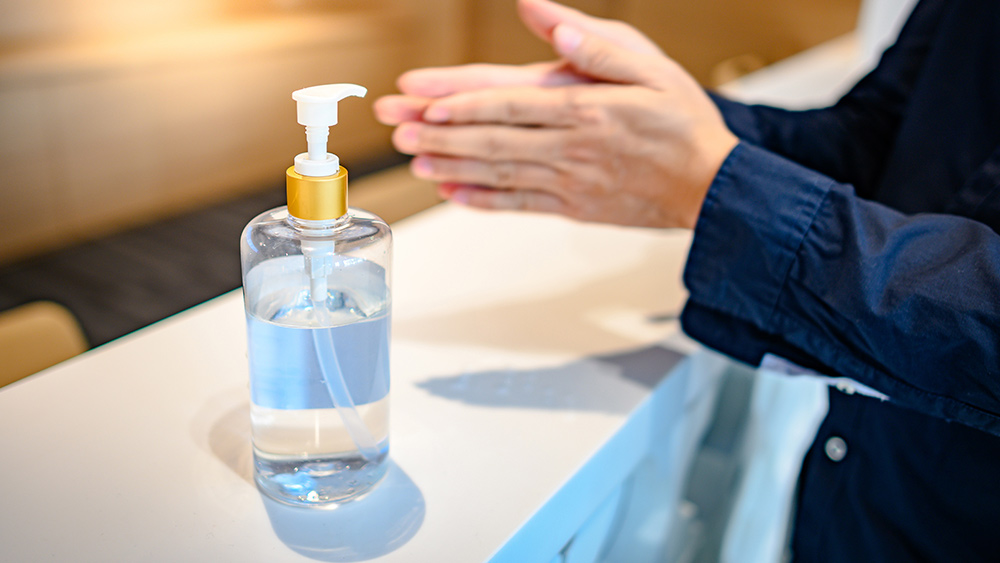
Advertisement
As coronavirus (COVID-19) continues to infect people throughout the globe, health experts advise the public to practice social distancing and wash their hands thoroughly using soap and water to help prevent further infections.
To maintain proper hygiene, people often use antibacterial hand sanitizers in the absence of soap and water. However, the Food and Drug Administration (FDA) warns that hand sanitizers from a certain manufacturer in Mexico should be avoided at all costs because they contain methanol, a toxic chemical.
Eskbiochem’s toxic hand sanitizers
The FDA cautioned consumers to avoid buying nine kinds of hand sanitizers from Eskbiochem SA de CV, a manufacturer based in Mexico, because they may be toxic.
Testing has revealed that the nine products all contain varying amounts of methanol, a type of alcohol that can be poisonous once it is absorbed through the skin or ingested. (Related: Coronavirus fears continue to spark panic buying of isopropyl alcohol and hand sanitizer across the USA.)
On June 19, the FDA published a letter warning against the use of Eskbiochem hand sanitizers, stating that methanol “is not an acceptable ingredient for hand sanitizers and should not be used due to its toxic effects.”
The federal agency warned that anyone who has been exposed to methanol-based hand sanitizers must seek medical treatment as soon as possible to address the toxic effects of methanol poisoning.
The FDA’s findings revealed that the CleanCare No Germ line contained 28 percent methanol. Eskbiochem’s Lavar Gel contained a shocking 81 percent of the toxic chemical.
The letter included a list of the nine toxic products from Eskbiochem:
- All-Clean Hand Sanitizer (NDC: 74589-002-01)
- CleanCare NoGerm Advanced Hand Sanitizer 75% Alcohol (NDC: 74589-008-04)
- CleanCare NoGerm Advanced Hand Sanitizer 75% Alcohol (NDC: 74589-009-01)
- CleanCare NoGerm Advanced Hand Sanitizer 80% Alcohol (NDC: 74589-003-01)
- CleanCare NoGerm Advanced Hand Sanitizer 80% Alcohol (NDC: 74589-005-03)
- Esk Biochem Hand Sanitizer (NDC: 74589-007-01)
- The Good Gel Antibacterial Gel Hand Sanitizer (NDC: 74589-010-10)
- Lavar 70 Gel Hand Sanitizer (NDC: 74589-006-01)
- Saniderm Advanced Hand Sanitizer (NDC: 74589-001-01)
The FDA concluded that anyone who uses Eskbiochem’s hand sanitizers is at risk of methanol poisoning, particularly small children who may accidentally ingest the products and adults who attempt to drink the products as an alcohol (ethanol) substitute.
Fast facts on methanol
Methanol, also called methyl alcohol, wood alcohol or carbinol, is a colorless, watery liquid with a strong odor. The chemical occurs naturally in humans, animals and plants.
The Centers for Disease Control and Prevention (CDC) reports that methanol is also manufactured as a solvent, pesticide and alternative fuel source.
Methanol can be toxic when ingested, inhaled in high concentrations or absorbed through the skin, like when someone uses methanol-based hand sanitizers. According to the CDC, methanol is toxic because of its metabolic products that cause an accumulation of acid in the blood, or metabolic acidosis.
Initial symptoms of methanol poisoning include:
- Confusion
- Drowsiness
- Headache
- A reduced level of consciousness (CNS depression)
- Ataxia (the inability to coordinate muscle movement)
The toxicity of methanol increases the longer it’s in your body, highlighting the importance of early medical treatment. Unfortunately, the signs of methanol poisoning may not be apparent for at least 72 hours after exposure.
According to the FDA, exposure to these methanol-based hand sanitizers may cause side effects like:
- Blurred vision
- Heart and respiratory failure
- Nausea
- Permanent blindness
- Seizures
- Vomiting
Using methanol-based hand sanitizers can also cause coma or even death.
Reported cases of methanol poisoning
Methanol poisonings are rare, but in 2013, over 1,700 cases were reported in America.
- In January 2016, two Tennessee high school students died after they ingested a mixture of Mountain Dew and methanol from racing fuel.
- In April 2018, a man from Massachusetts died after drinking alcohol contaminated with methanol.
According to the FDA, it advised Eskbiochem to recall its hand sanitizer products off shelves on June 17. But as of June 22, the company has yet to take action regarding the matter.
Hygiene tips to prevent the spread of coronavirus
Below are some tips from the World Health Organization (WHO) on maintaining proper hygiene and protecting yourself from COVID-19.
- Use running water to wash your hands thoroughly. Alternatively, you can use an alcohol-based hand sanitizer to kills viruses that may be on your hands.
- Maintain at least 1 m (3 feet) distance between yourself and others to avoid liquid droplets expelled via sneezing or coughing by someone who may be infected.
- Avoid crowded places.
- Don’t touch your eyes, nose and mouth to avoid spreading viruses.
- Cover your mouth and nose with your bent elbow or tissue when you cough or sneeze. Dispose of the used tissue immediately and wash your hands thoroughly.
- Keep alcohol-based hand sanitizers away from children and teach them how to use sanitizer properly.
- Don’t touch your eyes, mouth and nose right after using an alcohol-based hand sanitizer to avoid irritating your skin.
- Alcohol-based hand sanitizers recommended to protect against coronavirus are flammable. Don’t use them before handling fire or cooking.
- Don’t let drink or let children swallow a methanol-based hand sanitizer to avoid its fatal side effects.
The FDA recommends washing your hand thoroughly with soap and warm or hot water for at least 20 seconds to protect yourself from coronavirus.
If you don’t have access to soap and running water, the CDC suggests using hand sanitizer with at least 60 percent ethanol. Unlike methanol, the WHO considers ethanol safe to use for hand hygiene.
Sources include:
Advertisement
Advertisements
















